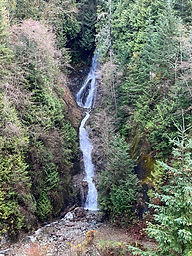Election Q&A: People's Party of Canada
- kc dyer

- Apr 10, 2025
- 4 min read
Candidate Peyman Askari shares his views

This is the third in a series of articles aimed at local readers prior to this year's federal election, which arrives in less than three weeks on April 28.
The Watershed has offered questions to each of the candidates running in the West Vancouver-Sunshine Coast-Sea to Sky Country.
People's Party candidate Peyman Askari moved to Canada at the age of six, grew up in West Vancouver and has worked in the tech sector. His platform can be found HERE.
Q: Living in a coastal village in British Columbia, local voters often feel sidelined by federal politics. What policies or plans do you have to engage the voters of Lions Bay?
A: As a candidate from a smaller party, our outreach is grassroots by both necessity and conviction. We’re currently engaging with voters through flyer drops, door-knocking, and holding speaking events in local parks. Our goal is to meet people where they are—not through scripted media appearances, but through honest, face-to-face conversations. If there are additional ways to better connect with Lions Bay residents, I’d genuinely welcome your suggestions.
Q: With our village located on the Átl’ka7tsem / Howe Sound Biosphere, many Lions Bay residents are deeply concerned about environmental issues. What are your priorities to address changing climate realities and to improve the protection and resiliency of this region against wildfires and drought?
A: While I don’t have direct firefighting experience, I’ve interviewed many former firefighters and search and rescue personnel who’ve shared with me the realities on the ground. Forest fires are a fact of life in BC—we’re not going to eliminate them entirely. But we can and should be managing our forests more effectively to protect communities like Lions Bay.
Unfortunately, what we’re seeing now is largely the result of poor management. Government has grown so large and bureaucratic that it can’t function effectively. I don’t believe the answer is to throw more money at the problem. Instead, we need good people from the community to step into these roles that have been, until now, run by professional politicians. A nation cannot function if it is being ruled by people who lack integrity.
Q: During this time of uncertainty because of the levying of international tariffs by the Trump administration, what commitment have you made personally to buying local and/or Canadian?
A: I take a different view from the conventional wisdom around “buying local.” While the sentiment is well-intentioned, I see it as a distraction from the real issue: Canada no longer has a strong industrial base. Outside of Alberta’s energy sector and some limited resource extraction in Ontario, we’ve offshored our productive capacity.
NAFTA was a mistake. It hollowed out our economy and left us vulnerable. Now, as the U.S. reshapes its trade policy to serve its own interests, we’re paying the price. Buying local might feel good—but it’s an empty platitude if we don’t rebuild our industrial strength. The federal government can’t keep promising handouts to laid-off workers while our debt skyrockets. The real answer is to negotiate better trade deals and launch a national vision to restore Canadian manufacturing and middle-class jobs. Without this, we leave ourselves open to both economic decline and the false promises of unsustainable socialism.
Q: Federal leaders have all been talking about housing shortages, but very little has been put forward about transportation. For those of us who use the Sea to Sky every day, we see what increased density without other transportation options means for commuters. What would you do to address the transportation problems faced in our region?
A: Transportation infrastructure in our region is a textbook case of government paralysis. Because so much of our land isn’t privately held—unlike in the U.S.—any large project must go through layers of federal, provincial, regional, municipal, and Indigenous government negotiations. Add to that a maze of environmental regulations and legal obstacles, and it becomes nearly impossible to move forward.
If residents want more transportation options, we need to be honest about the barriers. Either we elect strong leaders across all levels of government with the vision and will to cut through red tape and build infrastructure—or we rethink the model entirely. Personally, I support more direct democracy through binding referenda or plebiscites. Let the people vote directly on transportation priorities, instead of leaving it to bureaucrats and party politics.
Q: What else would you like to share with voters in Lions Bay?
A: I’ve been in Canada for 35 years, and I’ve watched this country gradually lose its way. Housing is unaffordable, families are shrinking, and communities are fraying. Canadians are more anxious, more divided, and more isolated than ever.
But I believe we can turn things around. Here are a few practical ideas I would advocate for:
Push decision-making back to the municipal level—whether it’s education, zoning, or transportation—so communities like Lions Bay have control over their own future.
Reform our public education system to teach civics, political philosophy, and financial literacy. Our youth should know how their country works—and how to manage their own lives responsibly.
Eliminate the $240 billion in grants that create dependency between municipalities and provinces. This top-down system stifles innovation and local accountability.
Promote a national vision rooted in small business ownership—where government supports individuals in building, growing, and leading. We need to inspire people to take charge of their lives, not rely on government to do it for them.

This is the third in a series of articles addressing the 2025 federal election.
Read Green Party candidate Lauren Greenlaw's views HERE.
Read Incumbent Liberal Party candidate Patrick Weiler's responses HERE.
Share your comments below, or email us at editor@lionsbaywatershed.ca
Like what you're reading? For as little as $5/month, you can support local independent journalism by subscribing to The Watershed HERE.





Comments